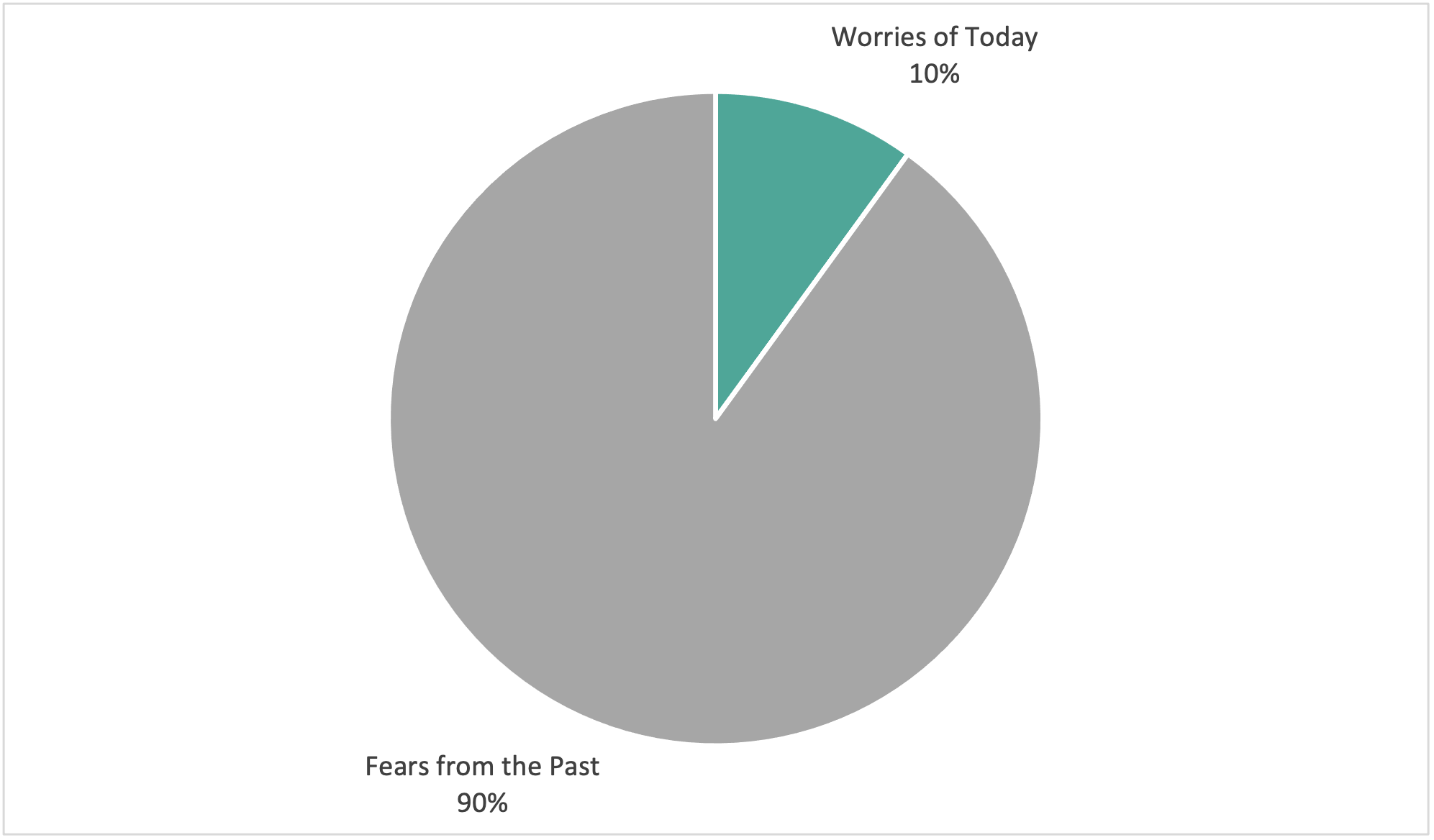Rekindle Your Spark online course is now available. Enrol here.


Are fears and debilitating emotions keeping you chained to the past? Do you feel trapped and stuck in fear? Do you replay in your mind the worst possible scenarios over and over again?
When it comes to fear, we have a choice about how much of our daily lives we hand over to it. F.E.A.R. can stand for:
False Expectation Appears Real
or
Face Everything and Rise!
The choice is yours.
Over 30 years ago I was sitting in a London counselling course when the teacher said, “90% of your clients’ issues will be based in their past and 10% are based in today”.
Just as I was drifting off in the lecture, I was startled awake when the teacher threw down a pile of books and reversed the message:
“10% of what your client wants to work on today is about what’s going on in their life right now and 90% of it is based in the past”.

Recognising how we default to past fears in our everyday life is a pivotal concept in the work of Dr Joe Dispenza who draws on neuroscience and epigenetics to describe the way our body and mind are hard-wired to replay worst possible outcomes. He explains that as humans we have large brains that afford us the capacity to think and to imagine; about our problems, past events and how we might envisage our future; all kinds of thoughts that have the potential to flood our body with a cascade of neurochemicals.
When we constantly relive the past or try to control the unpredictable future, we exhaust our bodies and brains. Dr Joe Dispenza provides hundreds of case studies in his book, You are The Placebo Effect: Making Your Mind Matter (Dispenza, 2014), that reveal the body struggles to differentiate between a stressful even occurring in real time or our memory of it. Either way the body is flooded with fear-fueled neurochemicals as we ‘replay’ these fears over and over again.
Most of my clients want to break the draining and debilitating cycle of fear to be calmer, clearer, happier and freer from the past.
Austrian psychiatrist and holocaust survivor, Victor Frankel (1905-1997) reminded us that our worst nightmares and experiences can be our best teachers. Dr Edith Eger (another holocaust survivor) added that “healing, fulfilment and freedom come from our ability to choose a response to whatever life brings us, and to make meaning and derive purpose from all we experience – and in particular, from our suffering”. (Eger, 2021, p. 8). In this compassionate way, freedom is a lifetime practice. A choice we get to make again and again each day and “we can’t heal what we don’t feel”.

Freedom lies in our ability to ‘unplug’ from the mind-to-body-fear and find a way to go within and ‘befriend’ the inner child and traumatised parts of ourselves to ultimately ‘re-wire’ our responses to freedom and choice. As Dr Bessel van der Kolk said in his beautiful book: The Body Keeps the Score, “When you activate your gut feelings and listen to your heartbeat – when you follow the interoceptive pathways to your innermost recesses – things begin to change”. (van der Kolk, 2015, p. 238)
Freedom and choice are the kind of emotions most people are searching for. I invite you to leave shame, blame, and needing to be right (all fear-based emotions) further behind you as you become curious and courageous to open your heart to new possibilities.
1. Breathing
3 times every hour, aim to practice breathing out for longer than you breath in.
2. Sleep
Aim to get 7-8* hours per night. Good quality sleep not only cleans our brain but it also plays an important role in healing as the brain permits old memories to fade away (van der Kolk, 2015, p.260)
3. Change
Make one small change today. All change takes courage. We only change when we are ready.
4. Self-Talk
“We have a choice” and “that was then and this is now” – good self-talk reminders (Eger, 2021, p. 155)
5. Growth
In every crisis there is a transition.
6. Feeling
Healing requires feeling. “What do I feel in my body right now?” Find ways of experiencing your body through movement such as exercise, dance, theatre, yoga, etc.
Remember that what we practice we get better at. We also know from the work of the wonderful authors who have inspired this blog post, that energy flows where attention goes – what you pay attention to grows stronger… The choice is yours. We have a choice about how much of our daily lives we hand over to F.E.A.R. and each of us have the capacity to flip fear to a more loving frequency.

And if you need some assistance to shift the past further behind you so you can access more energy and greater choices, give us a call to explore your options.
With love for you and your true potential,
Amanda x
*The minimum number of hours recommended for adults; younger and older people require more hours than this (Huffington, 2016)
Dispenza, D. J. (2014). You Are the Placebo: Making Your Mind Matter. Hay House.
Eger, E. (2021). GIFT: 12 lessons to save your life. Rider.
Huffington, A. S. (2016). The sleep revolution: Transforming your life, one night at a time (First edition). Harmony Books.
van der Kolk, B. A. (2015). The body keeps the score: Mind, brain and body in the transformation of trauma. Penguin Books.

Address: G03 / 75 Tulip Street, Cheltenham, VIC, 3192